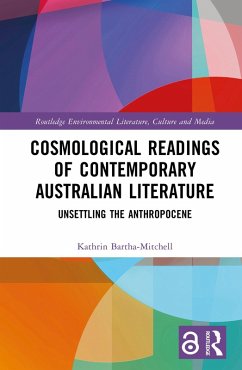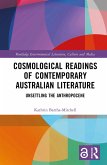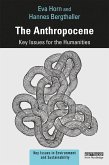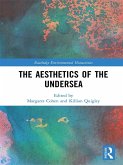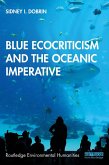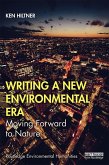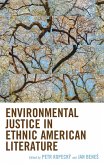The Australian continent has seen significant, rapid changes to its cultures and land-use from the impact of British colonial rule, yet there is a rich history of Indigenous land-ethics and cosmological thought. By using the age-old idea of 'cosmos'-the order of the world-to foreground ideas of a good order and chaos, reciprocity and more-than-human agency, this book interrogates the Anthropocene in Australia, focusing on notions of colonisation, farming, mining, bioethics, technology, environmental justice and sovereignty. It offers 'cosmological readings' of a diverse range of authors-Indigenous and non-Indigenous-as a challenge to the Anthropocene's decline-narrative. As a result, it reactivates 'cosmos' as an ethical vision and a transculturally important counter-concept to the Anthropocene. Kathrin Bartha-Mitchell argues that the arts can help us envision radical cosmologies of being in and with the planet, and to address the very real social and environmental problems of our era.
This book will be of particular interest to scholars and students of Ecocriticism, Environmental Humanities, and postcolonial, transcultural and Indigenous studies, with a primary focus on Australian, New Zealand, Oceanic and Pacific area studies.
Dieser Download kann aus rechtlichen Gründen nur mit Rechnungsadresse in A, B, BG, CY, CZ, D, DK, EW, E, FIN, F, GR, HR, H, IRL, I, LT, L, LR, M, NL, PL, P, R, S, SLO, SK ausgeliefert werden.
Tony Hughes-d'Aeth, Chair of Australian Literature, University of Western Australia, Journal of the Association for the Study of Australian Literature, Australia
"An innovative intervention in the environmental humanities, this thought-provoking study of contemporary Australian literature makes a powerful case for the generative concept of cosmos and, more broadly, for the importance of literary studies within the wider field."
Diletta De Cristofaro, Assistant Professor, Northumbria University, UK
"Where most ecocritical scholarship concentrates on stories set in a vulnerable future, Bartha-Mitchell's book disrupts this temporal straight-jacketing by examining texts that - roughly arranged - examine ecological pasts, futures and presents. Cosmological Readings thus introduces readers to new ecocritical stories, to a wider range of primary texts, and challenges limited thinking about where new imaginings on the environment, ecology and climate change might be found."
Geoff Rodoreda, Lecturer, University of Stuttgart, Germany

